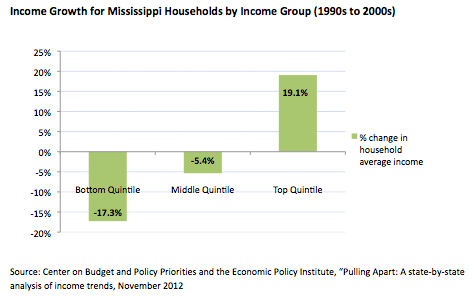Mississippi Ranks Highest Among States in Income Inequality from 1990’s to 2000’s
November 15th, 2012
A new report from the Center on Budget and Policy Priorities examines income inequality in the states. The Center looked at total income differences among bottom, middle, and top income groups as well as the rates of income growth among those income groups. According to the report, Mississippi has had the greatest increase among states in income inequality between the bottom, middle and top income groups from the late 1990’s to the mid 2000’s.
Income Growth for Mississippi Households by Income Group (1990s to 2000s)
In Mississippi, the top quintile of households realized a 19.1% gain in income from the late 1990’s to the mid 2000’s, while the middle and bottom quintiles saw a decrease in average household income. The largest decrease was for the bottom quintile of earners with a 17.3% drop in income.
Recommendations for Improving Income Equality
Develop Career Pathways for in-demand Careers that Pay Good Wages
Improve Education and Job Training to help families acquire the skills necessary to more up the economic ladder. Job training and higher education for adults and young students as well as improved investment in K-12 education would improve the educational attainment of Mississippi’s workforce.
Support Work through Access to Health Care, Child Care and Transportation
Ensure work supports like childcare, healthcare, and transportation are available that allow workers to maintain sufficient employment. One immediate way to increase work and decrease income inequality is by expanding Medicaid through the Affordable Care Act. Expanding Medicaid will create over 9,000 jobs and connect uninsured workers to insurance – leading to a more productive workforce.
Create a tax system that invests in the future
Mississippi’s tax system is regressive in that it requires people with low-incomes to pay more of their income towards taxes than people with high incomes. For example, a family of four earning $35,000 a year in Mississippi is in the same tax bracket as a similar family earning $1,000,000 a year. A system that takes a balanced approach that collects a little bit more from those who can afford to pay a little bit more would generate revenue to fund investments in the future such as education and training – the fundamental building blocks of economic security.
Our next blog post will take a closer look at some of the causes of income inequality in Mississippi.







